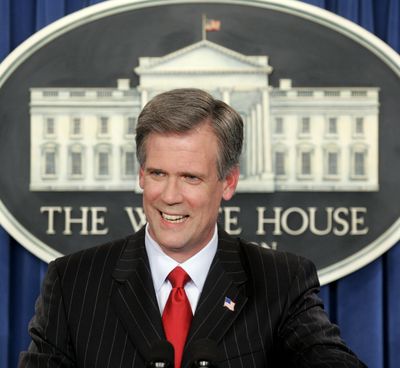Former press secretary Snow dies
53-year-old commentator had cancer

WASHINGTON – Tony Snow, the former television and radio talk show host who became President Bush’s chief spokesman and redefined the role of White House press secretary with his lively banter with reporters, died Saturday at Georgetown University Hospital. He was 53.
Snow was first diagnosed with colon cancer and treated in 2005, a year before joining the White House staff. But he found it had returned after an operation in March 2007. The cancer had spread to his liver, forcing him off the podium for treatment. Snow vowed to fight the disease and return to the briefing room but announced six months later that he was leaving his $168,000-a-year job because he needed to recoup the income he lost when he left his job as a radio and television host. He later joined CNN as a commentator.
In a statement issued by the White House, President Bush said, “Tony was one of our nation’s finest writers and commentators. … It was a joy to watch Tony at the podium each day. He brought wit, grace and a great love of country to his work.”
In his brief tenure as the president’s public advocate, Snow became perhaps the best-known face of the Bush administration after the president, vice president and secretary of state. Parlaying skills honed during years at Fox News, he offered a daily televised defense of the embattled president that was robust and at times even combative while still repairing strained relations with a press corps frustrated by years of rote talking points.
He was lively and entertaining, he could be disarmingly candid when ducking a question and he did not hesitate to retreat when it became clear he had gone too far. He could tell reporters to “zip it” one minute while defusing tension the next by admitting that he knew so little on a topic that he was “not going to fake it.” He enjoyed the give-and-take of a tough briefing, but his smile, upbeat energy and glib repartee seemed to take the edge off sometimes rough rhetoric on behalf of an unpopular leader and unpopular policies.
When the Washington Post’s Bob Woodward disclosed internal White House maneuvering to push out then-Defense Secretary Donald Rumsfeld, Snow tried to dismiss the account with a memorable putdown. “The book is sort of like cotton candy,” he said. “It kind of melts on contact.”
In short, Snow led the first press briefing for the talk-show era, and he played the role with gusto. As the first working journalist in 30 years to serve as White House press secretary, he loved to joust with reporters and expressed disappointment when they did not challenge him enough. He demonstrated little interest in the nitty-gritty of policy and delegated most off-camera reporter inquiries to his deputies. Precision was not his strong suit; translating difficult decisions into easily digestible explanations was.
Joining the White House as part of a staff shakeup in spring 2006, Snow quickly became a star among dispirited Republicans thirsty for an aggressive champion. In a break with tradition, the White House used him to headline Republican fundraisers around the country, as he became a high-profile advocate for the administration. He was routinely asked to sign autographs and pose for pictures while on the road. He also made the rounds of talk shows, hit the lecture circuit and even answered questions on a conservative blog.
ABC News correspondent Ann Compton, president of the White House Correspondents Association, said Saturday that Snow was “the first press secretary who chose to use the podium as a way to argue the president’s case – not just in the president’s words, but in his own.
“He was the first one who came from editorial writing and a pundit position, and he really did use that to articulate Bush’s point of view.”